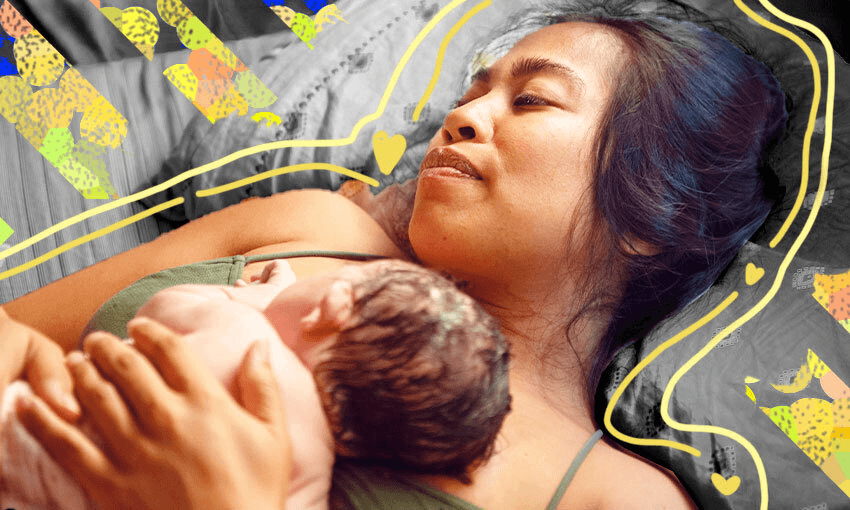In recent weeks, home birth has been dragged into Covid-19 vaccine politics after a small minority of midwives spoke out against mandates. But anti-vax beliefs and home-birth choices are far from natural bedfellows, argue George Parker and Eva Neely.
Last week was home birth awareness week. We celebrated home birth and shared stories and evidence surrounding home birth as a viable and positive birthplace choice. It was also a week in which we saw home birth dragged into Covid-19 vaccination politics with media reports that the home-birth community was supporting a minority of midwives in their stance against mandatory vaccination for Covid-19. We don’t accept that home birth and opposition to Covid-19 vaccination initiatives are natural bedfellows. Here is why.
There is a Facebook badge doing the rounds at the moment that reads “I have a healthy distrust of authority and I’m vaccinated.” As home-birthing parents, public health academics, and advocates for health consumer rights in Aotearoa, this badge perfectly captures why we are vaccinated against Covid-19. Distrust of medical authority is important in a world in which overmedicalisation is an issue. Yet, while we have a “healthy distrust” of medical authority, we have chosen to be vaccinated against Covid-19 without hesitation.
We both come from different walks of life. Yes, we share intersectional privilege as Pākehā educated people with well-paying, secure jobs that afford us extraordinary, inequitable and unjust health status in Aotearoa. Yet, like the home-birth community more generally, we are also very different and birth at home for different reasons. What many home-birthers share from our different positions is the contesting of medical consensus on how risk and safety during birth can only be mitigated when birth occurs in hospital.
In Aotearoa, like many western countries, birth is overmedicalised. There is well-established evidence that birth outside of hospitals under the care of midwives is not only safe for people with uncomplicated pregnancies, but also significantly reduces the risk of unnecessary and sometimes harmful medical interventions. Within the hospital environment, health providers have been shown to intervene in birth even when it’s not warranted and doesn’t improve outcomes for birthing people and their babies. There is a clear need to protect birthing space for whānau to ensure that physiological processes can occur uninterrupted, unless medical intervention is necessary to protect the safety of birthing parents and babies. The birth world can sometimes struggle to value the spectrum of care needs and protection of wellbeing, pitching so-called “natural birth” against “medicalised birth”. Many of us know that this is an arbitrary binary and that in reality wanting a home birth doesn’t mean that people don’t value having medical support on hand, when it is needed.
It is with dismay that we have seen the medical distrust of vaccines conflated with home-birth choices around the country over this past week. These debates suggest the two positions are inherently connected. The conflation of home birth with opposition to Covid-19 vaccination initiatives has resulted from a small minority of midwives and maternity consumers speaking up against the government mandate that requires health professionals (including midwives) to be vaccinated against Covid-19. This opposition to the vaccine mandate is counter to professional midwifery consensus by the New Zealand College of Midwives that supports Covid-19 vaccination for all pregnant people and health providers. Like the College of Midwives, we do not accept that midwifery-led home birth care and opposition to Covid-19 vaccination are natural bedfellows.
Home birth still comprises a minority of births, but has boomed under pandemic conditions, highlighting how medical consensus about safety and risk is never static. We have seen an exponential increase in numbers of people choosing to birth at home in western countries as hospitals have become epicentres of the pandemic and can therefore feel like unsafe places. Covid-19 management strategies have also limited movement in and out of hospitals and the ability for birthing people to be supported by their whānau. In this context, we might think of home birth not as a fringe activity that sits in opposition to the health system in pandemic times, but as an essential part of managing the strain placed on our health system during Covid-19 by moving birthing people under the care of midwives out of hospitals. Home birth also offers the opportunity for families who don’t need medical intervention to stay together and exercise self-determination over how they will welcome their babies, without the dictates of pandemic restrictions.
The Covid-19 pandemic is further challenging stereotypes of who might choose home birth and why, as all kinds of families reach for strategies to stay together and protect themselves from Covid-19. Like in all emergencies worldwide, midwives are proving to be key agents in helping health systems manage Covid-19, including absorbing the surge of interest we are seeing in home birth. A healthy distrust in medical authority in this instance isn’t counter to Covid-19 pandemic management, rather it is a critical part of supporting a flexible and resilient health system by supporting healthcare choices such as home birth that might otherwise not have been obvious choices for many families.
In the same way, we suggest that a “healthy distrust” of medical authority isn’t at all counter to an enthusiastic embracing of Covid-19 vaccination. Rather, we suggest that vaccination is another resource for families to keep themselves and their communities safe from the worst of Covid-19. Like home birth, Covid-19 vaccination offers us the possibility of keeping the people we love out of hospital, while also protecting the precious and finite resource of hospital beds and medical care for those that need it most. We have a “healthy distrust” of medical authority, we are home-birthers, and we have been vaccinated against Covid-19.
